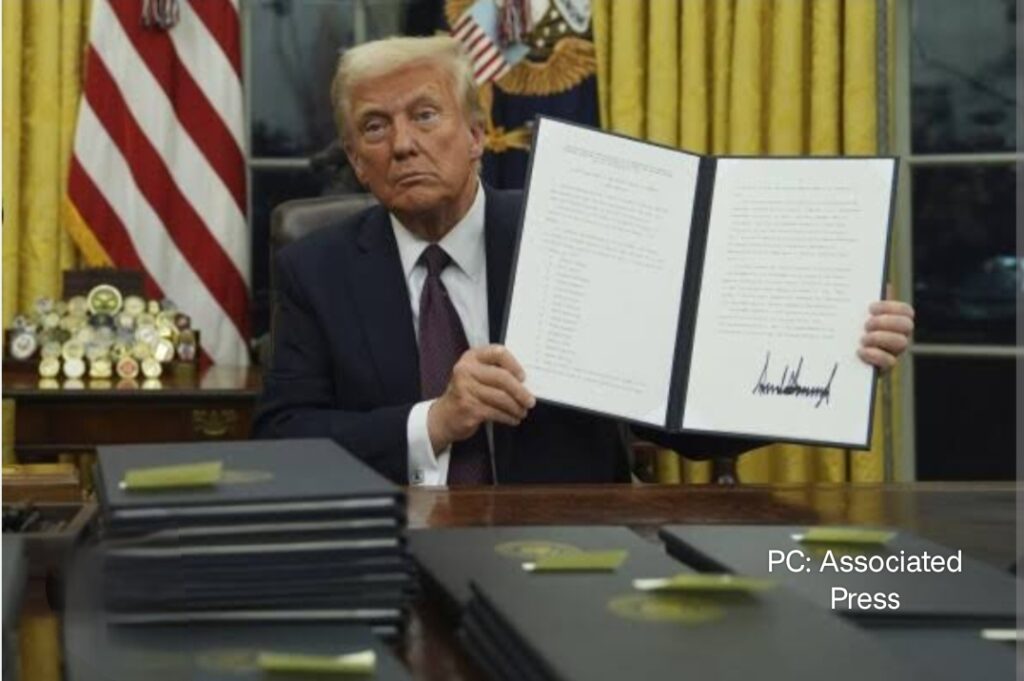Birthright Citizenship, which is included in the 14th Amendment of United States Constitution, grants citizenship to children born on US soil regardless of their parents’ status i.e. it grants US citizenship to everyone born in the US. This Amendment was made after the end of US Civil War (1861-1865) with an aim to provide equal civil and legal rights to Black people.
The Supreme Court cemented this interpretation 127 years ago, in the landmark case of United States v. Wong Kim Ark, wherein Wong Kim Ark was born in the United States and thus, the Citizenship Clause of the Fourteenth Amendment of the Civil Rights Act of 1866 automatically made him a US citizen. It was held that children born in the US to non-citizen parents are entitled to US citizenship and this principle has remained an undisturbed constitutional bedrock for over a century.
Trump’s executive order seeks to overturn this long-established precedent, a move that legal scholars say is likely to face significant judicial scrutiny. The Trump administration has deemed birthright citizenship as “ridiculous” and claims that ending it will curb illegal immigration.
On January 20, 2025, hours after taking oath as the 47th US President, Donald Trump signed a slew of executive orders. One such crucial order was to end the blanket rule of birthright citizenship.
The executive order states that even if a person is born in the US, citizenship will not be automatically granted to him/her if –
1. The child’s mother was present in the US unlawfully and the father was not a US citizen or permanent resident at the time of birth.
2. The child’s mother was in US temporarily, for example, on work, tourist student visa and the father was not a US citizen or permanent resident at the time of childbirth.
If Donald Trump’s order comes into effect, the children born to non-citizen couples, after February 19, 2025, will not be considered American citizens.
Trump’s administration is of the opinion that birthright citizenship incentivizes illegal immigration and places a strain on public resources. In defending the order, the Justice Department described it as an “integral part” of Trump’s efforts to reform the US immigration system. However, critics argue that this move will only serve to further marginalise vulnerable communities and create uncertainty for immigrant families. The consequences of this policy are far-reaching, with potential disruptions on schools, workplaces, and entire communities.
How Will This Impact Indians?
The Indian-American community, which is one of the fastest-growing immigrant populations in the US, will be profoundly impacted by this change as and when it comes through. This move is likely to hit not only illegal immigrants but also students and professionals from India.
According to the US Census Bureau, about 5 million Indian Americans are currently residing in the US, making up about 1.47 per cent of the US population. 34 per cent of this Indian American population was born in the US and became American citizens by virtue of birth.
This move could affect the children born to Indians who are waiting for their green cards or those on work visas like H-1 B, which is a temporary visa for highly educated foreign professionals to work in “specialty occupations” such as mathematics, engineering, technology, and medical science for a maximum of six years.
The future of US citizenship for Indian families through birth tourism faces major obstacles from Trump’s proposed birthright citizenship ban. Birth tourism enables parents to travel to developed nations including the United States to deliver their newborn children so these children can access improved educational prospects and career opportunities and better healthcare. The urgency to meet the birthright citizenship deadline has pushed numerous Indian parents to schedule C-sections for childbirth before February 19 when the new birthright citizenship order takes effect. Birthright citizenship applies to children born before February 19, 2025, but after that date citizenship will be denied unless at least one parent holds US citizenship or green card status. Doctors advise against premature caesarean sections because they create medical issues including underdeveloped lungs and feeding difficulties and low birth weight and neurological problems.
US Federal Judge John Coughenour issued a temporary injunction against President Donald Trump’s executive order which sought to terminate birthright citizenship throughout 22 states. Judge Coughenour deemed the order “blatantly unconstitutional” because it violated the 14th Amendment’s citizenship provision and Supreme Court precedents and because executive orders cannot modify the Constitution. He further noted that in his 40 years of career as a presiding judge he had never encountered an order as clearly unconstitutional. The court’s decision has however brought comfort to the Indian diaspora across the United States yet President Trump’s administration plans to pursue an appeal.
Conclusion
The doctrine of judicial review was established from the case of Marbury v. Madison 5 U.S. 137 (1803) and dictates that the courts receive equitable power to strike down executive actions which violate constitutional provisions. Judicial review assumes vital importance because it protects essential constitutional provisions from any challenge posed by executive orders. If the courts truly intend on protecting ‘birthright citizenship’, then they cannot do so without effectuating a constitutional amendment. However, bringing about an amendment would require approval from two-thirds of both houses along with three-quarters of state legislates, and given the recent circumstances, the issue is likely to remain unresolved for years to come.
In a nutshell, as the battle over birthright citizenship intensifies, the future of millions of families remains uncertain. There could be legal challenges in shaping the trajectory of this controversial policy. Ultimately, the outcome will depend on the ability of the lawmakers and courts to protect the rights of vulnerable communities and uphold the principles of justice and equality enshrined in the US Constitution.
Authors: Aishee Choudhury & Dev Agarwal

